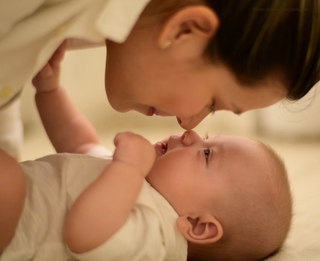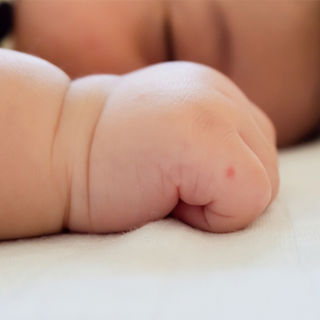
From the way your baby recognises your voice, face, touch to their first smile, your baby will surprise you in a million tiny ways. In addition to being adorable and innocent, babies have a remarkable blend of talents and abilities. They possess incredible skills right from even before they are born. Prepare to be amazed by these 10 fascinating revelations about your little one’s first year of life.
- Speech development begins inside the womb
Studies indicate that babies begin absorbing language while still in the womb. Babies can start hearing your voice and other sounds around 23 weeks of pregnancy, even while they lie warmly tucked inside your womb. Your baby will start to recognize your voice in the womb, and research states that the sooner you start speaking/reading to your baby, the more they begin to connect with you as they grow.
- Babies are born with the ability to swim
Babies are born with a “diving reflex” known as bradycardic response - a natural reflex for the baby to hold her breath when submerged under the water. A baby’s heart rate will automatically slow down while under water. What’s even more incredible is that, like fish, babies can actually breathe and swallow at the same time for the first few months of their life. They learn this talent while in the womb but begin to lose this ability around the 6-month mark.
- Birthmarks are surprisingly common.
It’s quite normal to see birthmarks on their skin at birth or shortly after. Around 80% of babies are born with some type of marking that occurred from tiny blood vessels under the skin that are dilated during labor.
- Newborns don’t have kneecaps.
Did you know this? Babies can make do without kneecaps. A baby’s kneecap, doesn’t develop into hard bone until the little one reaches around three to five years of age.
- Newborns are short-sighted
Newborns are near-sighted, which means far away objects look blurry to them. Baby’s sight works best from 8 to 12 inches away. This explains why babies seem to gaze at nearby objects.
- Babies have more bones than adults
It is estimated that babies are born with about 300 bones, which is about 100 more bones that a normal adult. As babies grow, their bones fuse together. The skull is a great example of this. It starts as three pieces of bone that eventually join together to make one solid bone.
- Babies' stomachs are surprisingly tiny
A newborn's stomach is only the size of a hazelnut. This explains why very young babies need to be fed so often. They simply don't have space in their tiny tummies to consume all the milk they need at once. Even the smallest of air bubbles takes up precious space which is why your baby needs to be burped during and after feeds.
- Babies learn much faster than adults
Even before birth, your baby has learnt to recognise your voice. Surrounded by so much stimulation, there is constant learning all the time. A baby’s brain is forming connections at an incredible rate as she discovers more about the world around her. Research suggests that the more words you baby hears in her first days, weeks, and months the better her language skills are likely to be by the time she starts school.
- Eye color can change
A newborn's eyes can change color in the six to eight months after birth. Eye color is determined by the amount of melanin present in the iris of the eye, which develops as newborn babies grow. The color of their eyes could be completely different than what they had at birth. If your baby has blue eyes, their melanocytes are secreting only a little melanin. If they secrete just a little bit more, your baby's eyes will look green or hazel. If your baby has brown eyes, the melanocytes are secreting a lot of melanin.
- Newborns can’t shed tears
Newborns cry an awful lot, but they can’t shed tears. Babies' tear ducts are still developing after birth, and it's normal for them not to shed tears for the first few months. They can, however, produce “basal tears,” the non-emotional tears we produce constantly to keep our eyes moist.
We’re sure these fascinating facts about your little one has left you awestruck. We’d love to know which of these amazed you the most. Drop a comment below.



















